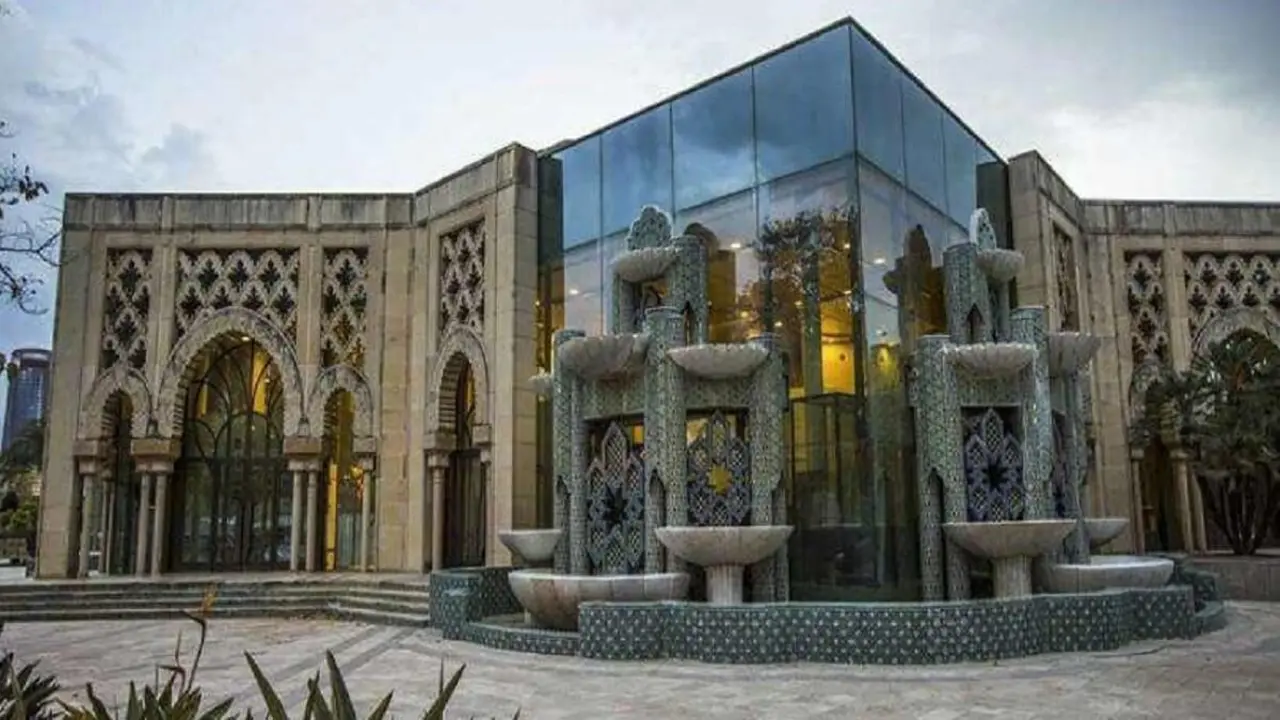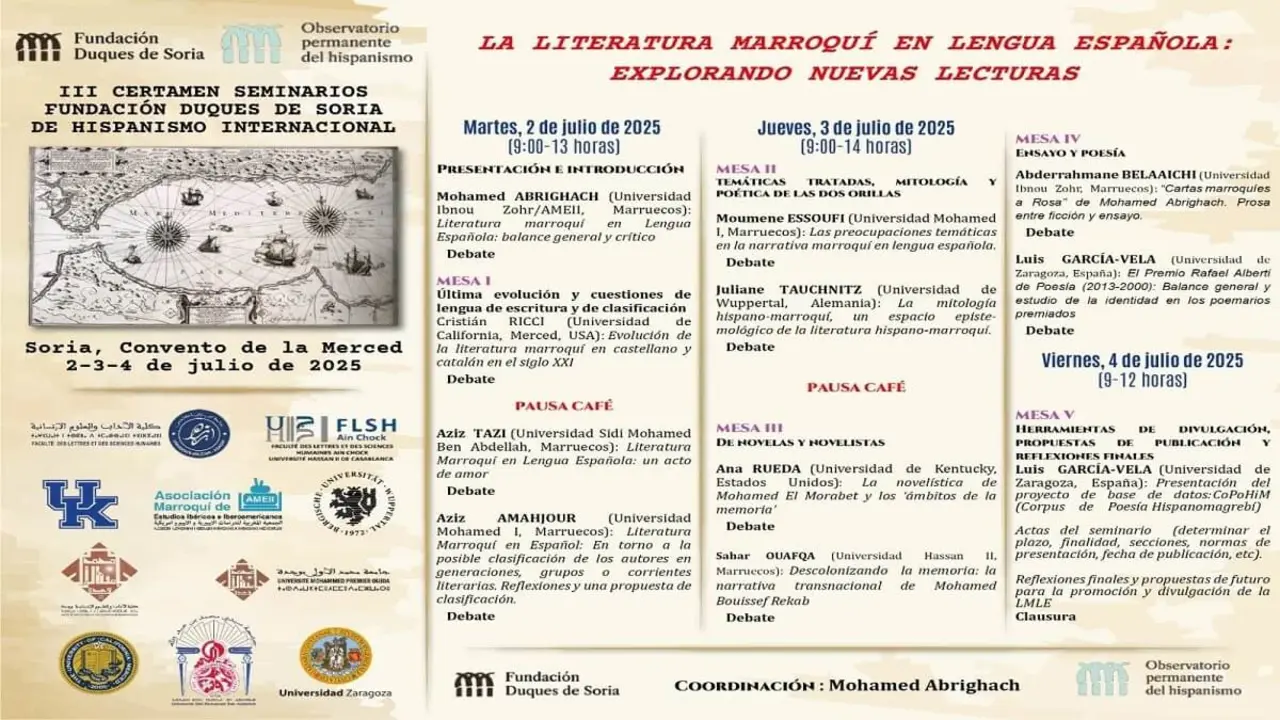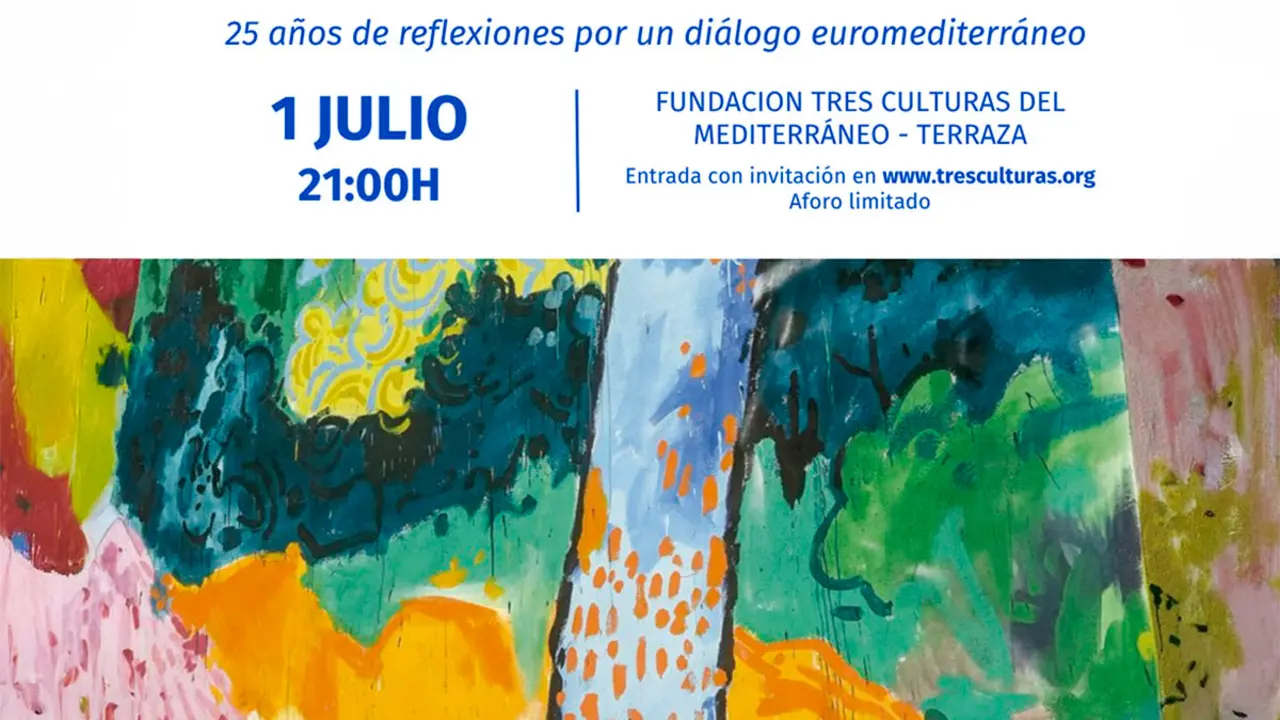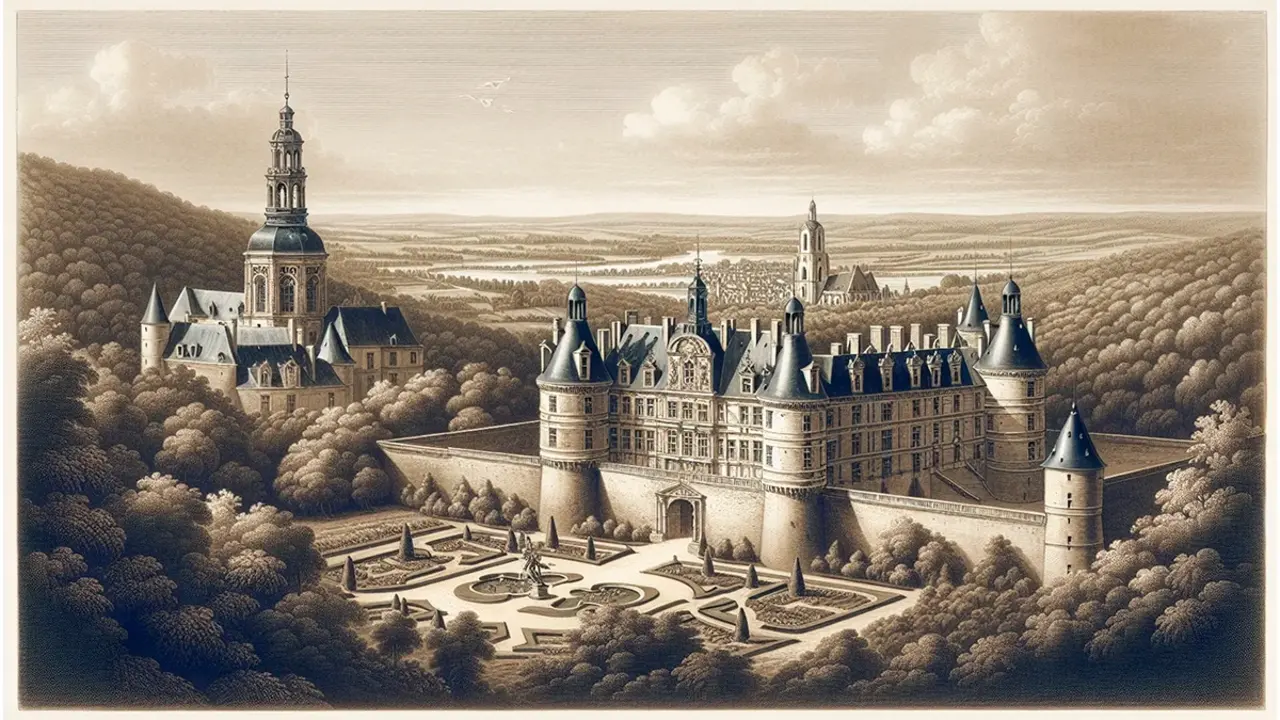Morocco, that neighbor that is both so close and so far

Morocco is that country so close to Spain, but sometimes so far away when it comes to understanding its social and political structure. In order to reach a greater understanding of what the Moroccan country is like, the book "Marruecos, el extraño vecino" (Morocco, the strange neighbour), published by Libros de la Catarata and written by Javier Otazu, has been the perfect excuse for the virtual debate organised with the participation of the author himself and Ángeles Ramírez, prologue of the text and director of the Department of Social Anthropology of the Autonomous University of Madrid, under the moderation of Karim Hauser, coordinator of International Relations of Casa Árabe.
Morocco's geographical proximity means that in Spain it feels the Alaouite kingdom is a very close country, but there are aspects of its social and political structure that are often misunderstood. As Karim Hauser pointed out in the meeting held through Casa Árabe's social networks, it is the "kingdom of paradox so often misunderstood", the only African nation that enjoys a border with Europe.
Javier Otazu, a journalist from the EFE agency, wanted to make it clear that the spirit of the book is informative, aimed at clarifying aspects of the reality of Morocco, in the face of the many clichés that exist. The book tries to take the pulse of the Moroccan society, which is not monolithic, even regarding the dominant Sunni Islamism or the way of relating to power. "My many years of living in Morocco have given me the confidence to better understand the pulse of society," said the journalist from the EFE agency.
"It is true that journalists keep things, they know more than they write, but we are obliged by the imperative of space and the medium and we stay in the aesthetic and superficial. The book tries to go beyond what I tell in the articles and address what allows us to understand this strange neighbor so that it is less strange to us", explained Otazu himself.
In her capacity as author of the book's prologue, Ángeles Ramírez, who has been a friend of the author for almost three decades, wanted to insist on the changes in Moroccan society. "From social anthropology these changes can be fundamental and we are witnesses of this. In the prologue, I reflect that many things have happened in 30 years in Morocco and Spain, and that Morocco has relocated itself within international capitalism with its resources, carrying out a great process of construction and development of large infrastructures with great political, legal and social changes, as Otazu says in the book", the UAM lecturer indicated. For Ángeles Ramírez, the best thing about Morocco is its people, who "live from day to day and make efforts to survive".

One of the figures that comes to light in "Morocco, the strange neighbour" is that of Mokadem, a character that Javier Otazu tries to explain, referring to him as the "last link in the civil service". He has neither a uniform nor an office, and is the eyes and ears of the state in every street and village. He has to know well who each neighbor is and what their weaknesses are and "report them to whom they should. "His official job is to issue documents of daily use, such as licenses or certificates of residence or bachelorhood. But everyone in Morocco knows he does something else.
There are two main reactions to this in the book; the Moroccans do not understand that he devotes even one paragraph to it, he is an official who is not news to them, he is insignificant, he is there and they are counting on it. Meanwhile, the foreigners have no idea that he exists. Their function is to be invisible to foreigners. With these two reactions, I realized that this is where their value lies, it's anodyne but full of meaning, a large part of the power rests on their shoulders," said Otazu.
The Mokadem is called an agent of proximity, but it plays a very important role, even as an intelligence service. Many terrorist cells are dismantled one after another in this way, the author explained. "The whole world envies us for our network of human information elements," one senior official even confessed to Javier Otazu.
Karim Hauser has brought to light the terms "elves" and "crocodiles" referred to by the EFE agency journalist in his book. Goblins" and "crocodiles" are expressions that are due to Abdelilah Benkirane, a politician who was head of government between 2011 and 2017. An Islamist figure with the ability to connect with the masses and use humour and metaphors, who realised in his own flesh the great power that King Mohammed VI and his clique have. Otazu has recalled that he called them "elves" and "crocodiles" and people already knew he was talking about them, since in Morocco everything around the king is unmentionable, and if it is mentioned it is to do so with praise, applause and superlative adjectives. "The King of Morocco's advisors cannot be criticised and that is why Benkirane spoke of goblins and crocodiles," said Javier Otazu.
The author of the book recalled that Benkirane believed that he could gain space for the government elected by the people, but the tricks he suffered were endless. He never blamed the Moroccan king, he simply said he was misguided by the "elves" and "crocodiles". The journalist has argued that King Mohammed VI did not like Benkirane because of his moralistic mood and his obsession with speaking in Arabic when French is used more. But he was constantly winning elections and in the last legislative elections he wanted to get rid of him and was able to get Saadeddine El Othmani, the man who currently heads the executive, "too accommodating" in Otazu's words.
Touching now on more social aspects, the moderator and director of International Relations of Casa Árabe has brought up the reference of Ángeles Ramírez to the case of Amina, a young woman who was raped and committed suicide after being given in marriage to her aggressor by a judge in Larache. This terrible story is reflected in the book and has marked a before and after in social issues, causing legal changes, although people continue to live in a patriarchal and reactionary regime, as the director of the Department of Social Anthropology of the UAM has pointed out.
For Ángeles Ramírez, the book is "a good treatment of the situation of women in Morocco". The prologuist has asserted that women's rights are yet to be achieved, that there have been important changes thanks to feminist and leftist movements, but that they do not reach all women. Ramirez has said that the Moroccan abortion law, which reproduces the Spanish one almost entirely between 1985 and 2010, has not yet been enacted, adding incest as a reason for abortion. The law is even less restrictive than the one Mariano Rajoy wanted to introduce into the Spanish system in 2014. The teacher also recalled that currently the movement of women on the street is uncomfortable because of the activity of street aggressors.
Ángeles Ramírez also highlighted that Moroccan women are very precarious in the world of work and that, especially, they are more exposed to aggressions and abuses. "The most conservative currents have weight and this affects women in more degraded or rural environments. Although there is a lot of activity from feminist and left-wing movements," she said.
Karim Hauser has brought to light the issue of the great weight of the French colony, which continues to be a burden and an important legacy in the body of laws, some of which are very rigid. This contrasts with the Islamist Justice and Development Party (PJD) in power. He has pointed out that the political elites educated in the French way have been replaced by Islamist middle classes, recalling that the very politicians who could be rebels, such as Benkirane, are the first to say that the Monarchy should not be reformed, nor should democracy be deepened, due to Morocco's characteristics and centuries-old tradition.
Javier Otazu has pointed out that they have suffered the reproach of Moroccan readers who understand that he is too condescending towards the Islamists of the PJD. But the author of the book explained that he has seen that the PJD has allowed the rise and visibility of classes that were previously invisible. "The elites have come from the aristocracy of Fez or from the upper commercial classes of Rabat or Casablanca. They went to the mosque from time to time, but what they liked best was going to Paris or Marbella; these elites prevented them from seeing another Morocco, which was not like them and was more majority. The people who have gone through the international school and who prefer to go to Istanbul, citizens who don't skip the mosque even on a Friday and who observe Ramadan to the letter. This was invisible and now it's coming with the Islamists as a historical revenge," said Javier Otazu, who sees this process with "sympathy".

Although the author of the book has also noted that this has not meant that the scenario has changed. According to his point of view, the PJD arrived and occupied its space, but it has not touched the religious power of King Mohammed VI; Otazu has explained that they have not asked for a greater division of powers, that they have not brought a discourse of social justice, nor have they questioned capitalism, that they have not touched the foundations of power in Morocco.
However, they have brought important symbolic things with their moralizing discourse in terms of politics. The journalist from the EFE news agency has pointed out that politicians used to get rich on luxuries and that now the Islamists continue to live modestly. He recalled the story of former chief executive Benkirane, who received him at home in his socks. "Benkirane's house was like that of another Moroccan, where he received journalists and politicians; the Moroccans saw that. The Islamists brought an image of morality to public life, even though the foundations of power have not changed," Otazu said.
An important point dealt with in the virtual debate organised by Casa Árabe on the book "Morocco, the strange neighbour" is the treatment of dissidents in the society of the North African country. Javier Otazu has rescued the case of a young man who in 2013 was sentenced to two and a half years in prison for converting to Christianity, a decision that ended up being revoked by an appeal court after pressure from American evangelical groups who were calling for greater tolerance from Morocco. And, also, the case of a British homosexual who in 2014 suffered four months in prison for an encounter he had with a man in Marrakech; a sentence that was also overturned by the mediation of the British Conservative Party and the campaign carried out to put pressure on Morocco. Javier Otazu explained that the external pressure could be strong because the Alaoui king and his clique know how to listen in order to rectify, but he also said that the internal pressure is even more intense. "This type of crime, such as being a homosexual or a Christian, is very badly regarded by society," said the journalist and writer. "Anyone who goes outside the norm or breaks with Islam or does not observe Ramadan is met with immediate social and family condemnation. Moroccan Christians have broken with their family and environment, and in this way they break with the community, even though it is very hard to understand," Otazu stressed.

Karim Hauser wanted to rescue the idea that the monarchy is deeply rooted and wanted to modernize under the reign of Mohammed VI, although the weight of tradition is enormous with centuries of continuity. The people identify with the monarch, the one who leads the way among the believers, the so-called "Prince of the Believers". The director of International Relations of Casa Árabe has wanted to ask himself about the main dichotomy between tradition and modernity.
Before this exhibition, Javier Otazu has clarified that, in Morocco, when there is a street protest, everybody has a picture of the king and he does not stop shouting "Long live the King". The King of Morocco "is like the amulet", which will "allow you to get out of any trance". The journalist from the EFE agency stressed that the demonstrations taking place are against conditions in general, without putting in doubt the Moroccan king, nor the monarchy. In the Arab spring years, the leaders of Arab countries were insulted, but in Morocco they never messed with the Alaouite king, they messed with the counsellors or against the corruption that was installed, Otazu recalled. "As for the King of Morocco, hardly anyone questions his political role, nor his military, nor his religious role, nor even his economic role, when he is the country's greatest fortune through his many companies," he said.
Javier Otazu presented the paradox of how to modernise the country if the power does not allow natural channels to be developed to make it arrive according to what proposals. "When someone questions the political system, the examples of Syria and Libya are used, and these examples scare off any kind of reform", explained Otazu, for whom flirting with the idea of chaos is one of the greatest misfortunes in the Arab world, and this leads to conservative and immobile positions.
To finish with the virtual meeting, Karim Hauser has brought to light the competition between France and Spain within this existing European contest to obtain the favors of Morocco or to be closer to the African country. Javier Otazu has used the idea of the "ugly bride syndrome" in his book. According to the writer and journalist, France exercises colonization in a more subtle and perfect way than when it was the empire over Africa. The French nation took the army out of there, but left behind a system of domination through language and schools. Javier Otazu has pointed out that in West Africa French is the language of communication. "School and language allow France to continue to exercise its subtle dominance over Morocco," Javier Otazu stressed. "France is the reference of culture and progress for any Moroccan, but it is also the main support of Morocco in its number one concern, which is the domination over Western Sahara. Morocco gives preferential treatment to France in all public contracts. The high-speed train is the jewel in the crown and was given to France because King Mohammed VI wanted to give it to Sarkozy. Spanish diplomats argued that there is a lot of Spanish experience in the work concerning all the works, but it is a question of subcontracting", argued the journalist from the EFE agency, for whom "the reality is that the sad fate of the Spanish business classes and political decision-makers is to be subcontractors of France". "Spain is the ugly bride that Morocco approaches when the beautiful one does not listen to her", Otazu said. The journalist also explained that France is the main supporter of Morocco internationally, although Spain does not lag behind, and stressed that the Spanish country takes out in exchange for the support given to Morocco before the UN the circumstantial task of controlling the southern borders, the benefit of Morocco controlling immigration in the way it does.








